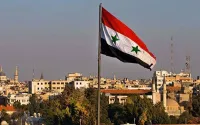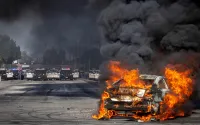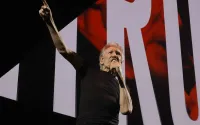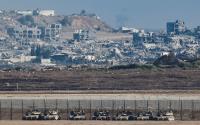There will be millions of people who will never forget Saturday February 15 2003. It was an extraordinary combination of the utterly prosaic and the deeply moving: a bursting bladder and the nearest toilets several hours' walk away in Hyde Park, an aching back and blisters, and then the remarkable sight of a heaving mass of people along the Embankment converging with crowds pouring across Waterloo bridge. Everywhere there were astonishing juxtapositions: the body-pierced peaceniks alongside the dignified Pakistani elder with white beard; the homemade placard "The only bush I trust is my own" drawing surreptitious giggles from a group of veiled Muslim women.
This was a day which confounded dozens of assumptions about our age. How much harder it is today than a week ago to speak of the apathy and selfish individualism of consumer society. Saturday brought the entire business of a capital city to a glorious full-stop. Not a car or bus moved in central London, the frenetic activities of shopping and spending halted across a wide swathe of the city; the streets became one vast vibrant civic space for an expression of national solidarity. Furthermore, unlike previous occasions when crowds have gathered, this was not to mark some royal pageantry, but to articulate an unfamiliar British sentiment - one of democratic entitlement: we are the people.
That is why Saturday was a defining moment in contemporary political culture - whatever it achieves in the debate on the war with Iraq. First, it shifted the tone of what Britain believes itself to be. Are we to be cowed by security threats and fear of our neighbours, our political culture crippled by suspicion into campaigns of ugly persecution? Saturday's march was a defiant no. The very best of Britain was on the city's streets (and for every person marching, there were more in sympathy at home): we showed ourselves to be a nation that is at ease with itself, compassionate, multicultural and tolerant. One of the day's many ironies was that this was the Britain which is so frequently exhorted in ministers' speeches. Among Saturday's demonstrators were New Labour's natural allies - fair-minded, decent people, the kind who don't walk on the other side of the street. They were beautifully British - patiently waiting when the march ground to a halt, politely apologetic if they bumped into you, and not overly friendly, the reserve only cracking briefly and occasionally.
Second, Saturday proved that the decline of democracy has been overstated. What has changed is the pattern of participation; political parties and turnouts may be declining, but intense episodic political engagement is on the increase. In recent years we have seen both the lowest turnouts and the biggest demonstrations in British political history - there's a conundrum to keep hundreds of political scientists busy.
Third, there was another intriguing characteristic of this protest. As we shuffled along the Embankment, someone yelled through a loudspeaker that we were too quiet, he urged us to shout. In reply, came a roar of noise which could be heard slowly rippling along the length of the march. No words, no slogans, just a roar which quickly subsided. For the next five hours, there were no loudspeakers until we finally arrived at Hyde Park just as the speeches finished - and we weren't even the last, the streets were packed behind us. Thousands of people on Saturday never heard a speech. Did it matter? Did we miss anything? No, because if truth be told, the speakers were a B-list of political has-beens and celebrities, and their speeches were pretty dreadful. This was a protest with no leaders and with little to say; it was not interested in debate. The "little" it had to say, was NO. It was as simple as that.
This was the most important aspect of all. The demonstration was driven by one very powerful and very accessible emotion: a deeply felt revulsion against modern warfare. Over the course of the 20th century, as our technological ingenuity made war ever more brutal, we discovered that it was the weakest civilians who suffer the most - the old, the young and the sick. As the sophistication of the weapons developed - cluster bombs, landmines - we learned that the killing goes on long after the peace treaties are signed. And when images are relayed all over the world within minutes, we have understood how violence in one part of the globe can destabilise and radicalise another, setting off uncontrollable chain reactions of more violence.
All of this knowledge is underpinned by something much more visceral. It is a sensibility formed by scores of war films such as Platoon, Saving Private Ryan, and thousands of TV images of the suffering of war's victims. How can we endure the suffering of Iraqi civilians on our television screens in two months' time? The tears which have embarrassed us in our cinema seats and in our armchairs may have been manipulated by Hollywood or newsmen, but they have enlarged our emotional imagination. We can now imagine, in a way that no previous generation has done, the families - just like our own - in a Baghdad suburb whose lives are now hanging in the balance. And we can imagine the suffering of those who prosecute the war, the sons and lovers - just like our own - bracing themselves to kill, and to die.
This groundswell of emotion doesn't generate anger - there wasn't much in evidence on Saturday - so much as stubborn resistance. That makes Tony Blair's battle to convince the British public all the harder. You can argue with people who are angry - there's a debate to be had, but you can't argue with "No". This is the politics of emotion which is fed, inspired and manipulated by mass communications. Blair is fighting against the images of war's victims which we hold in our heads - such as the one the Daily Mirror published of a sick child on its front cover on Saturday.
You can't use arguments about international law against such an emotional opposition, as Blair now appreciates - in his speech on Saturday, he switched to the moral ground. This is where debates about war end up, even if it isn't where they start.
But this is the hardest ground of all for Blair to win on; the onus lies with him to prove that war will cause less suffering than Saddam Hussein will, an impossible task given the huge uncertainties of the war's conduct, let alone its impact on the Middle East and relations between Islam and the west.
Not one bomb has been dropped on Iraq, not one shot fired and already there has been the biggest global protest movement ever seen. What happens once the orphans, the widowed and the killed appear on our screens? Then, the stubbornness will become anger. We said No, Not in our Names and we meant it. Blair will never be forgiven. A tragic end to a good prime minister who was swept to power on a promise that "things will only get better".






